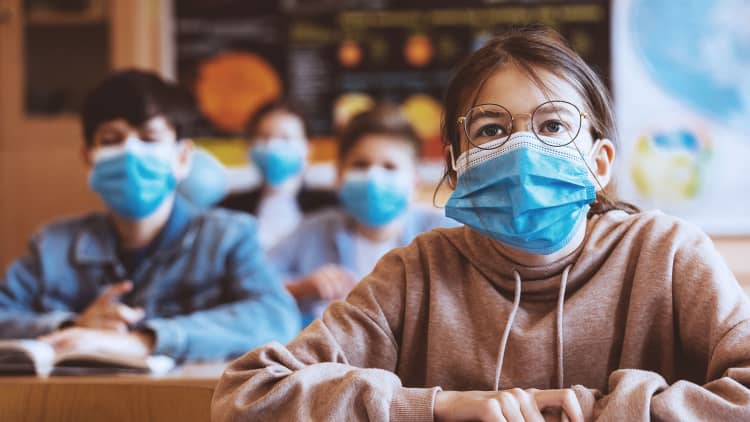
Remote schooling remains a struggle for many families. Yet there is still a real risk in returning to the classroom.
As of a recent tally, 87% of institutions have combined in-person and virtual learning in response to the public health crisis, according to a report by the Institute of International Education that was based on data collected in July from more than 500 colleges and universities in the U.S.
Now, months into the pandemic, the students who can learn in person are at an advantage, experts say.
The coronavirus outbreak laid bare how ill-prepared most schools had been when it came to remote learning. From grade school through graduate school, many institutions have struggled to provide the same level of education they did pre-Covid-19.
More from Personal Finance:
Here’s how to get more financial aid
College students are worried about their financial future
Pandemic sends young adults back to mom and dad
Among students, most said the quality of their online classes in the spring was fair or poor, according to a survey by the nonprofit Junior Achievement USA.
Research by the Collaborative for Student Growth at NWEA, a national nonprofit that assesses learning, also found that school closures due to Covid-19 will likely result in substantially lower achievement levels.
Still, reopening plans have varied nationwide, and now — halfway through the fall semester — some schools that initially reopened are closed and other schools that were closed have reopened for in-person learning.
At the college level, undergraduates voiced extreme dissatisfaction with remote learning, particularly at the same high cost they were previously paying for an in-person education.

Some have even taken their cases to court to argue that tuition should be lowered while they are studying from home. Tuition and fees plus room and board for a four-year private college averaged $49,870 in 2019-20; at four-year, in-state public colleges, it was $21,950, according to the College Board.
Vanderbilt University, in Nashville, Tennessee, was among the institutions sued by students after failing to refund a portion of tuition and fees from the spring semester. The university decided to reopen in the fall, and by most measures, the move was applauded.
Students have been back on campus for over a month and the number of coronavirus cases remains low. According to the school's public dashboard, there is a 0.43% positivity rate among students compared to Tennessee's 6%.
"The bottom line is it's going exceedingly well," said Vanderbilt Chancellor Daniel Diermeier.
Education is a ticket to a different life.Daniel DiermeierChancellor of Vanderbilt University
In addition to an ongoing dialogue with local health authorities and the capacity to do extensive testing and contract tracing, Diermeier credits the school's success to the strong message it sent to students early on to "step up."
"We are counting on you," he said.
Diermeier predicts more colleges and universities will reopen campuses in the spring as the stakes get higher for schools and students.
The institutions that remain remote risk undermining the value education provides to this generation, he cautioned.
"Education is a ticket to a different life, and we are not providing that right now," Diermeier said.
"This a profound tragedy with long-term consequences."


